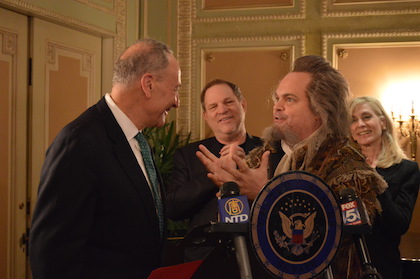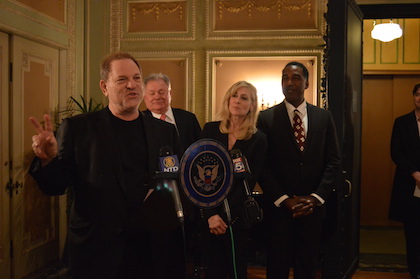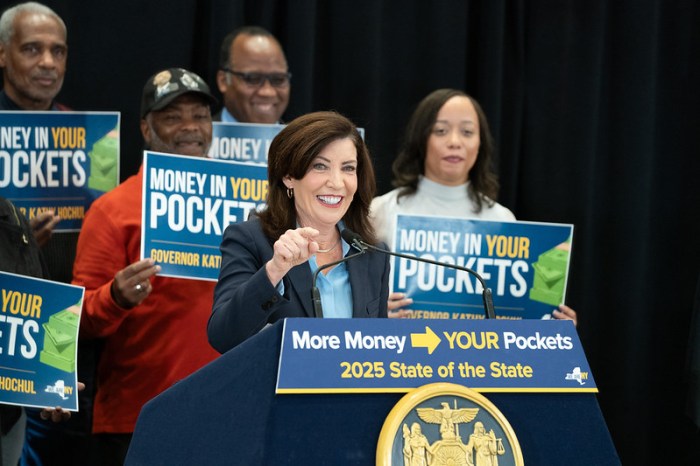
BY JACKSON CHEN | Investors in Broadway productions are now allowed significant new tax breaks through a recently signed federal law expected to incentivize the creation of more Broadway shows and other live theater nationwide.
The Support Theater in America Growth and Expansion or STAGE Act was signed into law by President Barack Obama on December 18 and will allow theater investors to claim tax breaks the same year they invest. The more immediate tax deduction would allow investors to recover capital quickly and continue to invest in what they bet will be the next Broadway hit.
“Very simply, if you invest you should be able to deduct that investment,” said New York Senator Chuck Schumer, adding that investments would be creating more theater jobs.
Prior to the law, Broadway producers would take their risk by investing their money into a play but were only able to claim deductions as shows incurred matching expenses. That accounting approach tied up producers’ capital for years at a time, and it also meant they might be liable for tax gains on a show’s profits before enjoying their full expense deduction.
“It takes years sometimes before Broadway shows will make a profit,” Schumer said. “It discouraged people from investing and it discouraged people from producing.”
Instead of enduring the waiting game, the STAGE Act allows producers to get same-year tax deductions on their hefty contributions to the creation of live theater.
“It doesn’t cost dollars or tens,” said Jeffrey Seller, a three-time Tony Award-winning producer, of financing shows on Broadway. “It costs thousands, tens of thousands, hundreds of thousands to develop new shows.”
Seller said he expects the new law to incentivize people to pursue funding more shows since they would immediately get the benefit of their deductions. He invested in several recent theater hits, including “In the Heights” and “Hamilton,” both of which were created by and feature Broadway’s latest supernova, Lin-Manuel Miranda.
“This frees up capital to start developing the next show for all of the different investors who want to take capital and invest in the next Lin-Manuel,” Seller said.
Seller took a big risk in backing the Washington Heights-based musical “In the Heights” in 2007, according to Miranda’s father, Luis.
“To put a show like ‘In the Heights’ on stage, it costs millions and millions of dollars,” the senior Miranda said. “For an unknown person at that point like my son Lin-Manuel Miranda, someone had to take risks and the risks were higher when there aren’t the tax provisions to help that producer.”
Film and television studios and producers were already afforded the benefits the STAGE Act provides, and the new law works to level the playing field by including live theater productions in the breaks provided by the federal tax code.
“Until now, the live theater industry has been severely disadvantaged because of the treatment under the Internal Revenue Code,” said Robert Wankel, chair of the Broadway League. “Our investors who may have been fortunate enough to produce a profitable show faced tax liabilities before they even earn their money back.”
Wankel, who also is the president and co-CEO of the Shubert Organization, said the situation before the passage of the STAGE Act left promising Broadway shows with a predicament.
“When your business model requires you to go out and seek investors to risk their money, that’s an extremely difficult position to be in,” Wankel said. “You have to tell potential backers that in addition to the severe risk involved, they may be subject to tax payments before they even turn a profit.”

The new law, which was introduced by Schumer, the state’s senior US senator, allows theater investors to claim immediate tax breaks for up to $15 million in their investments in theater productions. According to the law, 75 percent of whatever investors put in must be used for services in the United States to promote the growth of theater-related jobs at home.
Broadway buffs are hoping the new change will boost the expanding industry. According to the Broadway League, attendance in the 2014-2015 season reached 13.1 million patrons for Broadway theaters. The league’s numbers also showed that Broadway contributed $12 billion to the city’s economy and provided approximately 87,000 local jobs.
“This is a good year for Broadway but they’re not all good years,” Schumer said. “In a sense, this is our insurance policy in a bad year, which we hope we never have.”
Longtime Broadway actor Brad Oscar, who is currently playing Nostradamus in “Something Rotten!,” quipped it was not his show but the old federal tax code instead that was “something rotten.” But with the new law in place, Oscar thanked Schumer on behalf of the Broadway community.
“I see high drama and theatricality and it has nothing to do with the Republicans, no,” Oscar heartily joked, in character as Nostradamus. “It’s new shows on the Broadway.”



































